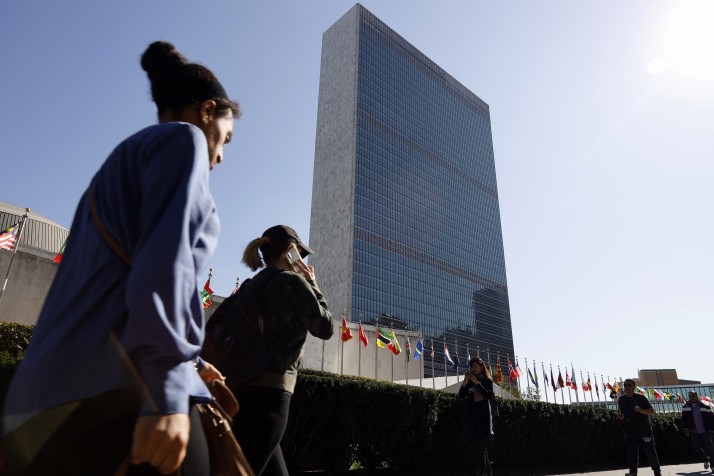| World |
| Bringing nations together | |
|
|
 People pass by the UN Headquarters in New York City, the U.S., on October 14, 2019 (XINHUA)
During a recent exclusive interview with Beijing Review, former French Prime Minister Jean-Pierre Raffarin shared his view on the role of the United Nations and China-France cooperation within its framework. He also stressed that France and China have a common understanding that the UN must reform. An edited excerpt of the interview follows: Beijing Review: How do you evaluate the UN's work in the past 75 years? Jean-Pierre Raffarin: The UN, established in the wake of World War II, was the splendid manifestation of an exceptional will for peace. The supreme body for dialogue among all nations, it has enabled the longest period of peace in modern history. The UN Security Council, peacekeeping operations... there have been many peace initiatives during this period. However, the world has changed a lot since its establishment 75 years ago. Africa is no longer the same, Asia has changed, the rules and the balance of power continue to change. To save multilateralism, the UN must reform and adapt to the new world situation. How do you view the importance of the UN, the World Health Organization (WHO) in particular, in coordinating global response to the novel coronavirus disease (COVID-19)? During the COVID-19 crisis, nations have generally played the national protection card rather than that of international cooperation. This is unfortunate because by definition, viruses know no borders. As far as vaccines, treatments and prevention programs are concerned, international solidarity is more relevant than ever. Efforts must be made to strengthen WHO rather than weaken it. France and China have a common understanding in this respect.  Patients at the Sanaa International Airport, Yemen, board a UN plane to go abroad for treatment on February 3 (XINHUA)
Facing new challenges such as pandemics and climate change, what reforms should the UN undertake? The priority must be to bring nations together. It is not acceptable that when a nation encounters difficulties, it decides to slam the door on multilateral organizations. This is what has happened with the UN Educational, Scientific and Cultural Organization (UNESCO), and this year with WHO, and to some extent, with the World Trade Organization (WTO). Multilateralism does not make sense without the U.S., nor would it make sense without China. The UN must ensure the representativeness of its bodies. The Security Council should also review certain of its aspects to improve its functioning and regain its referee function. The UN should have the means to strengthen its partnership with regional organizations. This is particularly true with regards to African organizations. We must always seek to strengthen the legitimacy of the UN. Against the backdrop of U.S. unilateralism and trade protectionism, will the globalization and multilateralism represented by the UN continue to move forward? What is the future of humankind—globalization, partial globalization, or a retreat to isolation? The importance of the UN correlates with dialogue in global governance. By attacking cooperation and dialogue, unilateralism attacks multilateral institutions such as the UN, WTO, UNESCO, WHO... Isolationist, inward-looking attitudes lead straight to the most severe tensions, even to war. International cooperation promotes peace. Exchanges enrich nations, by creating value. Of course, global governance can be complex, and a balance must be found between sovereignty of various countries and the need for cooperation. It is normal that every nation seeks to protect its independence, but the best way to do that is certainly not by isolation or protectionism. Only by sharing common rules can we strike a balance, the source of international harmony. A peaceful future depends on our ability to invent "regulated globalization." The past decades have witnessed China's rapid growth and its increasing participation in the UN. How do you assess China's role in the UN? China has played a major role at the UN for the past seven decades. Everyone has noticed the country's commitment to peacekeeping operations and also President Xi Jinping's visits to the UN headquarters in New York City (2015) and Geneva (2017), and in particular, to Paris (2014) to deliver an important speech on cultural diversity at UNESCO. China has also often stepped up to make up for certain countries' failure to respect their commitments, notably the case of the U.S. at the UN, UNESCO and WHO. The UN is the home of multilateralism. This is where the survival of world governance based on a charter of values is at stake. Major causes such as peace, the fight against poverty, respect for diversity and protection of the planet are areas of convergence that can make it possible to overcome differences and create a bright future for humankind. China and France are both founding members of the UN. How do you evaluate their cooperation within the UN framework on issues such as climate change? France and China both speak in favor of multilateralism. But are they talking about the same sort of multilateralism? Since we have to invent multilateralism for the 21st century, it seems to me that joint French-Chinese efforts regarding new multilateralism must be a priority in our cooperation. We have demonstrated our capacity for action by working together on the Paris Agreement on climate change. We must build on this common will in a concrete way. France and China have participated in major international aid initiatives. The delivery of Chinese medical goods to France has been particularly appreciated. Our current cooperation within the UN could be strengthened in several areas such as Africa's development, investment rules, conflict prevention, the revival of WTO, public health issues, the fight against poverty, promoting the UN Children's Fund... The main thing is to cooperate for peace. Copyedited by Sudeshna Sarkar Comments to yanwei@bjreview.com |
|
||||||||||||||||||||||||||||
|